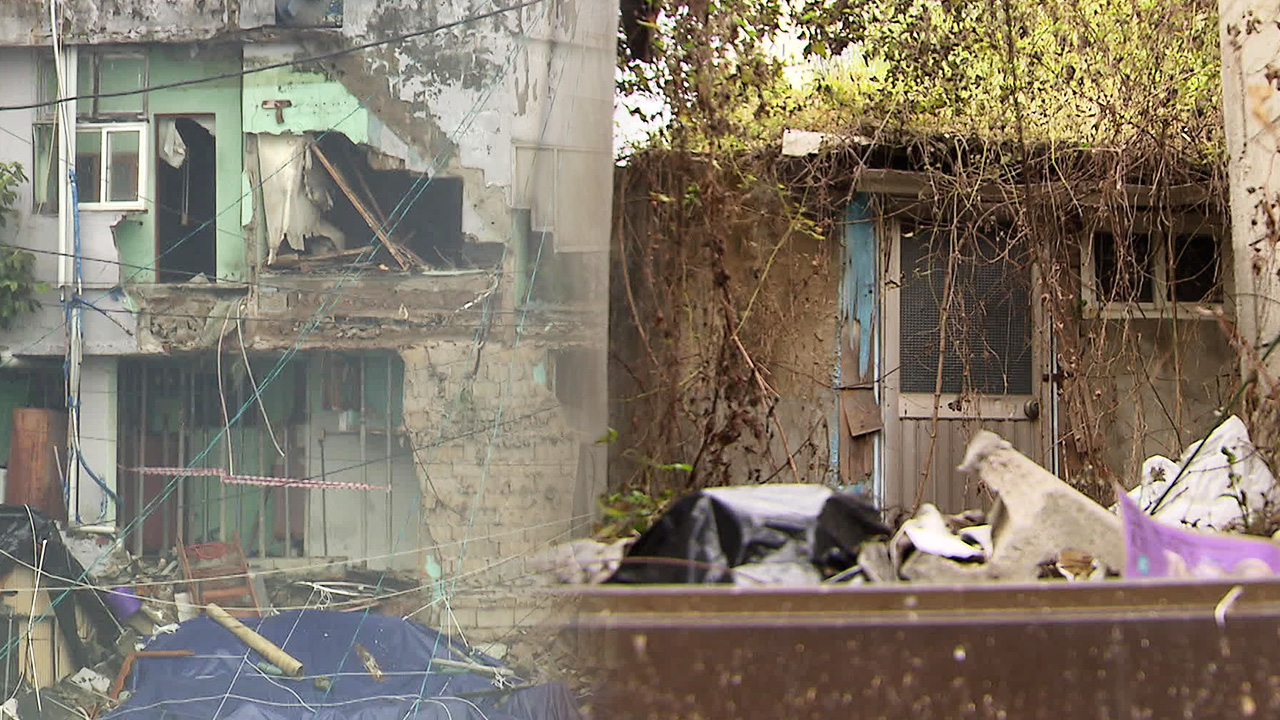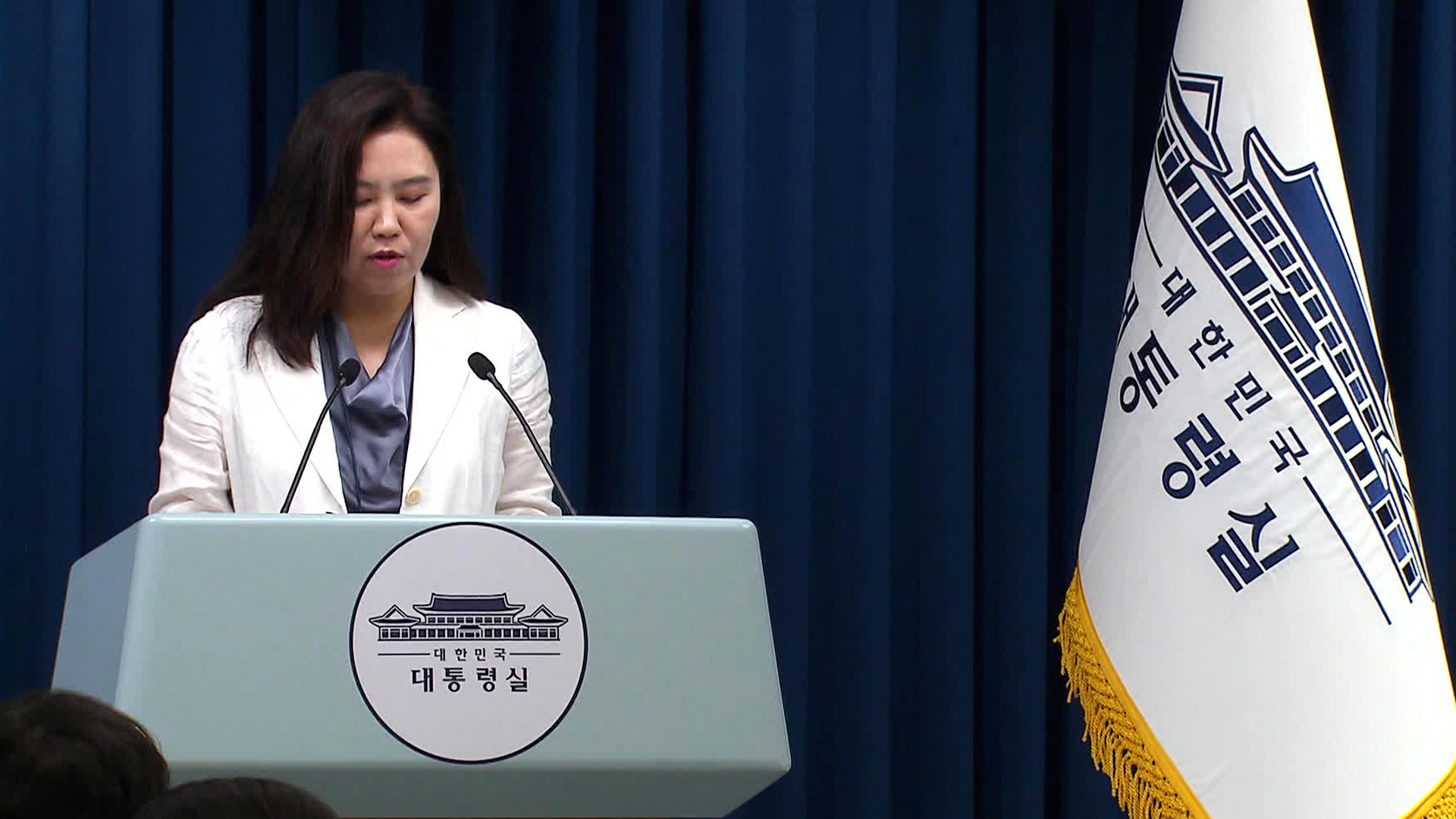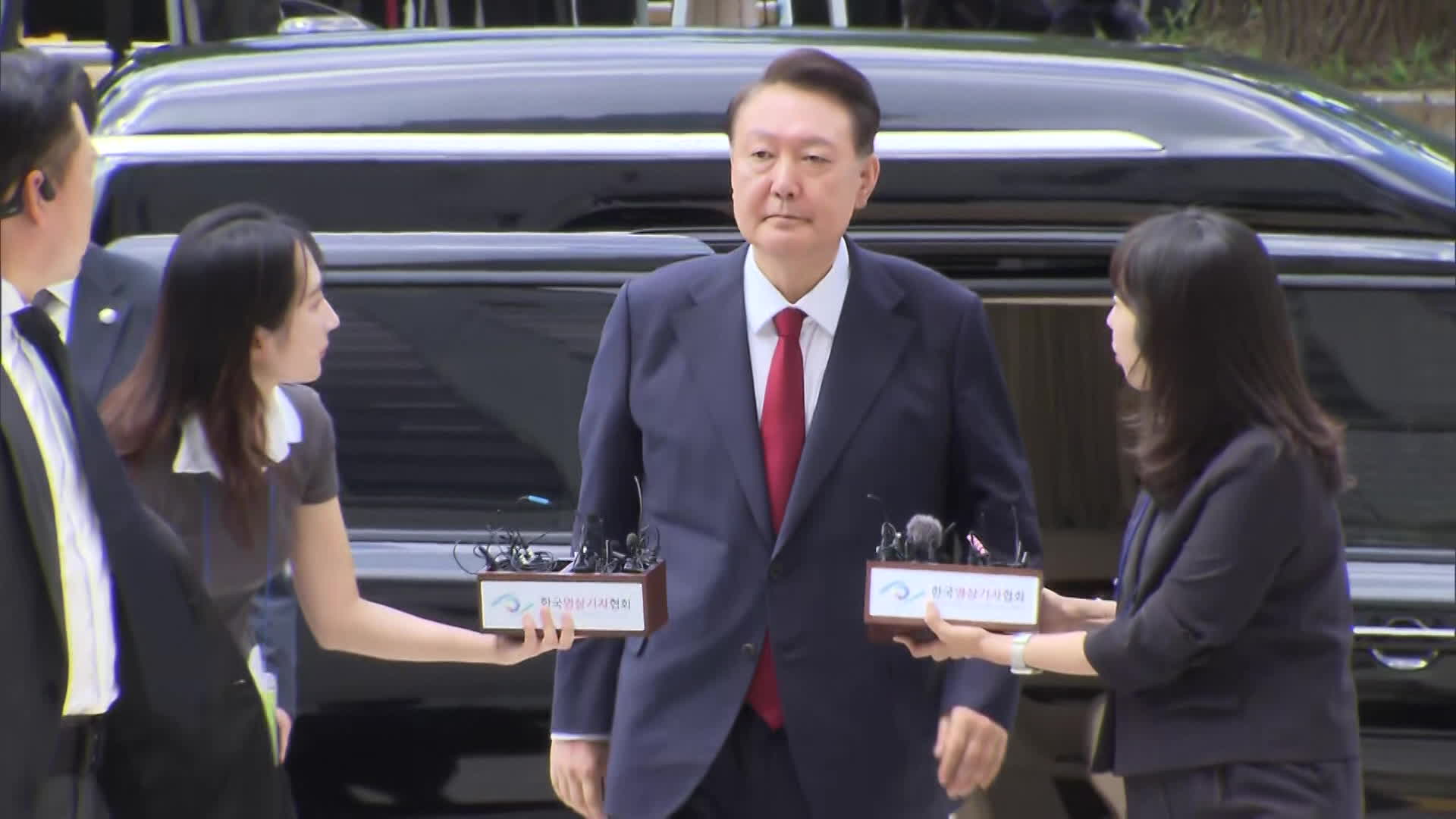Abandoned vacant houses increase threat to safety in neighborhoods, solutions remain ineffective
입력 2024.11.10 (00:34)
읽어주기 기능은 크롬기반의
브라우저에서만 사용하실 수 있습니다.
[Anchor]
Last month, an abandoned house that had been left unattended for a long time collapsed in Busan.
There are over 130,000 such vacant houses nationwide.
There are many concerns about safety accidents and crime occurrences, but action cannot be taken.
Reporter Shin Soo-bin has the story.
[Report]
Just after the cats in this residential area quickly flee, the roof and bricks of the house collapse.
This is footage of a three-story vacant house collapsing, captured by CCTV in a redevelopment area in Busan.
Fortunately, no one was injured, but about ten neighboring residents were evacuated.
Residents say the accident was foreseen.
They reported that there had been safety issues with the building for five years, such as cracks in the walls, but it had been left unattended until it collapsed.
[Local Resident: "There was a warning notice posted. What if there is another collapse while living here? (I was) really surprised."]
This is a village in the metropolitan area where redevelopment has been delayed for nearly ten years.
Some houses have been demolished, but more than ten vacant houses remain abandoned.
Not only are they unsightly, but they have also become places for youth delinquency.
[Local Resident: "They smoke a lot here. (Because there is nobody here.)"]
Due to delays or cancellations in redevelopment, relocation to new towns, and resident deaths, there are over 130,000 houses nationwide that have been left unattended for more than a year.
If unlicensed buildings are included, the number is expected to be much higher.
Moreover, contributing to this number rapidly increasing is population decline and aging.
[Local Resident: "There are vacant houses nearby, and if you go up, there are more vacant houses. Everyone goes to nursing homes, and only the elderly live here until they pass away."]
Currently, it is rare for local governments to forcibly demolish vacant houses, even if the owners do not comply with safety measures or demolition orders.
According to relevant laws, if a demolition order is not complied with, a compliance fine can be imposed.
However, there is a high possibility that the owner will contest this by filing an administrative lawsuit, and there is also insufficient budget for forced demolitions.
[Local Government Official: "(Lawsuits) are very likely. In fact, administrative personnel and such are very complicated and difficult. (In case of the owner's death) we have to find all the children and get consent forms, but not all children share the same opinion."]
The incentives provided by the government are currently not yielding effective results.
Starting this year, the government moved to impose a reduction on property tax for owners who demolish vacant houses, for it to be charged on houses and not land for five years.
Additionally, a system was introduced where if a single-household, single-home owner purchases one more house valued at less than 400 million won in a population-declining area, it will not be included in the housing count, but the response has been low.
[Shin Byeong-yoon/Professor of Architecture at Dong-Eui University: "(Along with tax benefits) it is necessary to create economic revitalization plans tailored to the characteristics of the area. Efforts in this regard are certainly needed for balanced development."]
There are also calls for the introduction of a vacant house tax, as implemented in Canada and the UK, but there are significant concerns about the tax burden on some vulnerable groups, which could lead to adverse effects.
Experts emphasize that the vacant house issue cannot be resolved with temporary measures, and it is important to focus on preventing accidents while establishing and executing a phased maintenance plan swiftly.
This is KBS News Shin Soo-bin.
Last month, an abandoned house that had been left unattended for a long time collapsed in Busan.
There are over 130,000 such vacant houses nationwide.
There are many concerns about safety accidents and crime occurrences, but action cannot be taken.
Reporter Shin Soo-bin has the story.
[Report]
Just after the cats in this residential area quickly flee, the roof and bricks of the house collapse.
This is footage of a three-story vacant house collapsing, captured by CCTV in a redevelopment area in Busan.
Fortunately, no one was injured, but about ten neighboring residents were evacuated.
Residents say the accident was foreseen.
They reported that there had been safety issues with the building for five years, such as cracks in the walls, but it had been left unattended until it collapsed.
[Local Resident: "There was a warning notice posted. What if there is another collapse while living here? (I was) really surprised."]
This is a village in the metropolitan area where redevelopment has been delayed for nearly ten years.
Some houses have been demolished, but more than ten vacant houses remain abandoned.
Not only are they unsightly, but they have also become places for youth delinquency.
[Local Resident: "They smoke a lot here. (Because there is nobody here.)"]
Due to delays or cancellations in redevelopment, relocation to new towns, and resident deaths, there are over 130,000 houses nationwide that have been left unattended for more than a year.
If unlicensed buildings are included, the number is expected to be much higher.
Moreover, contributing to this number rapidly increasing is population decline and aging.
[Local Resident: "There are vacant houses nearby, and if you go up, there are more vacant houses. Everyone goes to nursing homes, and only the elderly live here until they pass away."]
Currently, it is rare for local governments to forcibly demolish vacant houses, even if the owners do not comply with safety measures or demolition orders.
According to relevant laws, if a demolition order is not complied with, a compliance fine can be imposed.
However, there is a high possibility that the owner will contest this by filing an administrative lawsuit, and there is also insufficient budget for forced demolitions.
[Local Government Official: "(Lawsuits) are very likely. In fact, administrative personnel and such are very complicated and difficult. (In case of the owner's death) we have to find all the children and get consent forms, but not all children share the same opinion."]
The incentives provided by the government are currently not yielding effective results.
Starting this year, the government moved to impose a reduction on property tax for owners who demolish vacant houses, for it to be charged on houses and not land for five years.
Additionally, a system was introduced where if a single-household, single-home owner purchases one more house valued at less than 400 million won in a population-declining area, it will not be included in the housing count, but the response has been low.
[Shin Byeong-yoon/Professor of Architecture at Dong-Eui University: "(Along with tax benefits) it is necessary to create economic revitalization plans tailored to the characteristics of the area. Efforts in this regard are certainly needed for balanced development."]
There are also calls for the introduction of a vacant house tax, as implemented in Canada and the UK, but there are significant concerns about the tax burden on some vulnerable groups, which could lead to adverse effects.
Experts emphasize that the vacant house issue cannot be resolved with temporary measures, and it is important to focus on preventing accidents while establishing and executing a phased maintenance plan swiftly.
This is KBS News Shin Soo-bin.
■ 제보하기
▷ 카카오톡 : 'KBS제보' 검색, 채널 추가
▷ 전화 : 02-781-1234, 4444
▷ 이메일 : kbs1234@kbs.co.kr
▷ 유튜브, 네이버, 카카오에서도 KBS뉴스를 구독해주세요!
- Abandoned vacant houses increase threat to safety in neighborhoods, solutions remain ineffective
-
- 입력 2024-11-10 00:34:10

[Anchor]
Last month, an abandoned house that had been left unattended for a long time collapsed in Busan.
There are over 130,000 such vacant houses nationwide.
There are many concerns about safety accidents and crime occurrences, but action cannot be taken.
Reporter Shin Soo-bin has the story.
[Report]
Just after the cats in this residential area quickly flee, the roof and bricks of the house collapse.
This is footage of a three-story vacant house collapsing, captured by CCTV in a redevelopment area in Busan.
Fortunately, no one was injured, but about ten neighboring residents were evacuated.
Residents say the accident was foreseen.
They reported that there had been safety issues with the building for five years, such as cracks in the walls, but it had been left unattended until it collapsed.
[Local Resident: "There was a warning notice posted. What if there is another collapse while living here? (I was) really surprised."]
This is a village in the metropolitan area where redevelopment has been delayed for nearly ten years.
Some houses have been demolished, but more than ten vacant houses remain abandoned.
Not only are they unsightly, but they have also become places for youth delinquency.
[Local Resident: "They smoke a lot here. (Because there is nobody here.)"]
Due to delays or cancellations in redevelopment, relocation to new towns, and resident deaths, there are over 130,000 houses nationwide that have been left unattended for more than a year.
If unlicensed buildings are included, the number is expected to be much higher.
Moreover, contributing to this number rapidly increasing is population decline and aging.
[Local Resident: "There are vacant houses nearby, and if you go up, there are more vacant houses. Everyone goes to nursing homes, and only the elderly live here until they pass away."]
Currently, it is rare for local governments to forcibly demolish vacant houses, even if the owners do not comply with safety measures or demolition orders.
According to relevant laws, if a demolition order is not complied with, a compliance fine can be imposed.
However, there is a high possibility that the owner will contest this by filing an administrative lawsuit, and there is also insufficient budget for forced demolitions.
[Local Government Official: "(Lawsuits) are very likely. In fact, administrative personnel and such are very complicated and difficult. (In case of the owner's death) we have to find all the children and get consent forms, but not all children share the same opinion."]
The incentives provided by the government are currently not yielding effective results.
Starting this year, the government moved to impose a reduction on property tax for owners who demolish vacant houses, for it to be charged on houses and not land for five years.
Additionally, a system was introduced where if a single-household, single-home owner purchases one more house valued at less than 400 million won in a population-declining area, it will not be included in the housing count, but the response has been low.
[Shin Byeong-yoon/Professor of Architecture at Dong-Eui University: "(Along with tax benefits) it is necessary to create economic revitalization plans tailored to the characteristics of the area. Efforts in this regard are certainly needed for balanced development."]
There are also calls for the introduction of a vacant house tax, as implemented in Canada and the UK, but there are significant concerns about the tax burden on some vulnerable groups, which could lead to adverse effects.
Experts emphasize that the vacant house issue cannot be resolved with temporary measures, and it is important to focus on preventing accidents while establishing and executing a phased maintenance plan swiftly.
This is KBS News Shin Soo-bin.
Last month, an abandoned house that had been left unattended for a long time collapsed in Busan.
There are over 130,000 such vacant houses nationwide.
There are many concerns about safety accidents and crime occurrences, but action cannot be taken.
Reporter Shin Soo-bin has the story.
[Report]
Just after the cats in this residential area quickly flee, the roof and bricks of the house collapse.
This is footage of a three-story vacant house collapsing, captured by CCTV in a redevelopment area in Busan.
Fortunately, no one was injured, but about ten neighboring residents were evacuated.
Residents say the accident was foreseen.
They reported that there had been safety issues with the building for five years, such as cracks in the walls, but it had been left unattended until it collapsed.
[Local Resident: "There was a warning notice posted. What if there is another collapse while living here? (I was) really surprised."]
This is a village in the metropolitan area where redevelopment has been delayed for nearly ten years.
Some houses have been demolished, but more than ten vacant houses remain abandoned.
Not only are they unsightly, but they have also become places for youth delinquency.
[Local Resident: "They smoke a lot here. (Because there is nobody here.)"]
Due to delays or cancellations in redevelopment, relocation to new towns, and resident deaths, there are over 130,000 houses nationwide that have been left unattended for more than a year.
If unlicensed buildings are included, the number is expected to be much higher.
Moreover, contributing to this number rapidly increasing is population decline and aging.
[Local Resident: "There are vacant houses nearby, and if you go up, there are more vacant houses. Everyone goes to nursing homes, and only the elderly live here until they pass away."]
Currently, it is rare for local governments to forcibly demolish vacant houses, even if the owners do not comply with safety measures or demolition orders.
According to relevant laws, if a demolition order is not complied with, a compliance fine can be imposed.
However, there is a high possibility that the owner will contest this by filing an administrative lawsuit, and there is also insufficient budget for forced demolitions.
[Local Government Official: "(Lawsuits) are very likely. In fact, administrative personnel and such are very complicated and difficult. (In case of the owner's death) we have to find all the children and get consent forms, but not all children share the same opinion."]
The incentives provided by the government are currently not yielding effective results.
Starting this year, the government moved to impose a reduction on property tax for owners who demolish vacant houses, for it to be charged on houses and not land for five years.
Additionally, a system was introduced where if a single-household, single-home owner purchases one more house valued at less than 400 million won in a population-declining area, it will not be included in the housing count, but the response has been low.
[Shin Byeong-yoon/Professor of Architecture at Dong-Eui University: "(Along with tax benefits) it is necessary to create economic revitalization plans tailored to the characteristics of the area. Efforts in this regard are certainly needed for balanced development."]
There are also calls for the introduction of a vacant house tax, as implemented in Canada and the UK, but there are significant concerns about the tax burden on some vulnerable groups, which could lead to adverse effects.
Experts emphasize that the vacant house issue cannot be resolved with temporary measures, and it is important to focus on preventing accidents while establishing and executing a phased maintenance plan swiftly.
This is KBS News Shin Soo-bin.
-
-

신수빈 기자 newsubin@kbs.co.kr
신수빈 기자의 기사 모음
-
이 기사가 좋으셨다면
-
좋아요
0
-
응원해요
0
-
후속 원해요
0















이 기사에 대한 의견을 남겨주세요.